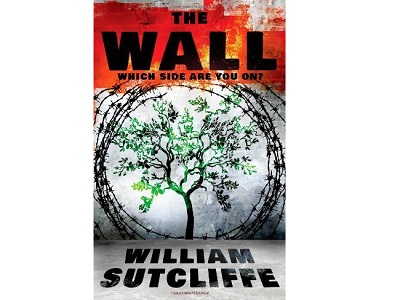
By Susan Abulhawa
Writing a novel that depicts an oppressed society when you are not a member of that society is a risky undertaking in my estimation. When it comes to the Palestinian narrative, the task is even more sensitive, as Western audiences have mostly been exposed to reductive stories, written by non-Palestinians.
It is not surprising then, that a Palestinian might have reason for pause when confronted with a novel that reflects life under Israeli occupation, written by a British Jewish author.
Right or wrong, the author’s background is relevant to me in such circumstances. So I admit that I picked up Sutcliffe’s latest novel, The Wall (Bloomsbury, 2013), holding my breath, because a people’s narrative, their truth, their memories, and their very real pain, is not to be taken lightly in literature.
Sutcliffe clearly understood this, and he created what I believe is the best work of fiction on Palestine written by a non-Palestinian. The Wall is many things – a coming of age story, a fast-paced, captivating novel. Most importantly, it is a fresh and intriguing look at the most intractable conflict of our time, written with suspense and cultural insight.
The story opens when Joshua’s ball lands in a fenced construction zone. When he climbs over to retrieve it, he finds a destroyed home unlike anything he had ever seen in Amarias, the clean, manicured place where he lives. The things of living still inhabit the house, like “a telephone with no receiver, trailing a wire that snakes away as if it is still expecting call”. Joshua is immobilized by a feeling he cannot understand, “something to do with the obvious suddenness with which this place was transformed from a home into a heap of junk.”
There, Joshua discovers a tunnel that runs under the separation wall to the forbidden side, where the enemies live. Compelled by curiosity and a sense of adventure, Joshua crawls through, and the prose carries the reader in Joshua’s heart as he navigates through fear in the dark dank underground. What Joshua finds at the other end of the tunnel unhinges everything he had been taught to believe and he emerges with eyes that see clearly the surreal way in which his world had been manufactured. “..not one thing I can see feels like it is mine,” he says. “A man speaks, and it’s Liev – the man who pretends to be my father, sitting at the table that pretends to be a dinning table in this house that pretends to be my house.”
Sutcliffe tells us that Amarias, the fictional town where Joshua lives, is based on the illegal Israeli settlements in the West Bank. But the words “Israel” and “Palestine” are never used, allowing for a weightless narrative unencumbered by preconceptions.
I thought the superficially apolitical approach to a deeply political space was effective, reminding me of Orwell’s Animal Farm. It has the ability to speak to readers of a wide range of ages, from young teens to senior adults, with layers of meaning revealed in accordance with the reader’s background. Further, and importantly, there is an authenticity to the narrative that speaks to the author’s insight and ability for true empathy.
The most wonderful thing about this novel, however, is the way it keeps the reader teetering on the edge of Joshua’s innocence, in the place where fundamental choices about an individual’s life path are made. We root for Joshua to follow his heart at the same time we fear for him to do so. The brilliance of The Wall is also in the way it allows the reader seamless and natural access to a great unfolding international drama. It does so through the eyes of a boy enchanted with a young girl on the other side of a wall that splits the world; and through his promise to an old farmer to heal a parched patch of earth with dying olive trees.
The tenderness of this novel is matched only by the author’s integrity, as Sutcliffe stipulated in his book contract that a significant percent of his royalties go to the world and children whose lives he wrote about. Playgrounds for Palestine, a Palestinian children’s NGO that I founded has received (and will continue to receive) 15% of the author’s royalties for The Wall. It should be noted that Playgrounds for Palestine is an all-volunteer labor of love organization that does not pay compensation to any staff or board members.
I highly recommend this novel, for young and old alike. It’s a fast read that grips the reader’s attention from the beginning, and long after you’ve read the last pages, you will be thinking of Joshua’s life, peeling back the layers, and finding deeper meaning.
– Susan Abulhawa is the author of Mornings in Jenin, an international bestselling novel, currently translated into 33 languages. Abulhawa is also the founder of Playgrounds for Palestine, a children’s NGO dedicated to upholding the Right to Play for Palestinian children living under occupation and/or in refugee camps. She contributed this article to PalestineChronicle.com.





Although at first glance the book appears boring and uninteresting it is not. As the book unfolds it becomes an interesting piece of literature about a young Israeli boy who discovers what life is like on the other side of the West Bank Wall.
At times the book can seem uneventful or dragged out but over all it is a good read.
Nice book I really want to know what will happen in the end and there so.ething suspicious about Joshua the place his living